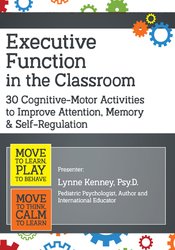

Teaching students how they think, learn and behave empowers them to play an active role in their own learning. When children with ADHD, anxiety, learning differences, oppositional tendencies and disinterest in school are taught how to be “Cognitive Scientists” coaching their own brains to plan, prioritize, attend and remember, they become more invested in school and motivated to learn.
Taking the mystery out of executive functions by showing students how to learn more efficiently while calming their defensive brains leads to better concentration, improved attention, higher academic achievement and competent social-emotional skills.
In this recording, Lynne Kenney, Psy.D., pediatric psychologist, author and international educator, will teach you how to integrate the newest research in neuroscience, kinesiology and education for kids to learn more efficiently.
You will discover over 30 developmentally progressive cognitive-exercises, worksheets and activities to enliven your classroom.
Learn how to improve cognition, enhance learning and empower children to be better thinkers with motor movement, sequencing, attending, self-regulation and memory activities.
What You Need to Know about Movement and Cognition
Current Research on the Role of Movement in Learning
Activities, Tools and Strategies
Alerting, Attending and Energizing
Self-Regulation
Attention/Memory
Behaviour
Please wait ...